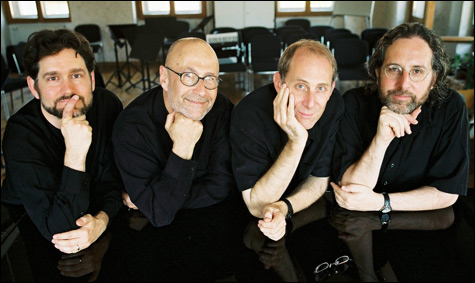
CHOOSE LIFE: The Lódz song cycle mixes lament and affirmation.
|
In Boston, it’s the season of Lódz. Leslie Epstein’s stage adaptation of his novel King of the Jews, based on the experience of Poland’s Lódz Nazi ghetto during World War II, just finished a run at the Boston Playwrights’ Theatre. And this weekend — March 17 and 18 — the Jewish music ensemble Brave Old World are bringing their Dus Gesang fin Geto Lodzh|Song of the Lodz Ghetto to the Jewish Theatre of New England.
The song cycle —released as a CD on the German Winter & Winter label in 2005 — takes in many moods and styles. There’s klezmer-style wedding music, laments, parodies, a bit of Beethoven’s “An die Freude,” and original pieces composed in the mode of Brave Old World’s self-styled “New Jewish Music.” The core of the piece is drawn from songs written or sung by residents of the ghetto and collected by the ethnomusicologist Gila Flam. It begins with a little folk song sung by one of the ghetto’s survivors, Ya’akov Rotenberg, in a lo-fi recording made in 1985. A scratchy modern-day fiddle picks up the melody as Rotenberg’s voice fades, and then a second, querying minor-key strain enters on piano, graced with rich, dulcimer-like ornaments. The piano solo modulates into another, more portentous theme augmented by deep bass notes and florid runs. We’ve been transported from the past into the present. There’s a segue into a dance figure as piano is joined by fiddle, accordion, and finally Brave Old World’s Michael Alpert singing the celebratory “A gants fayn mazltov” (“A really fine mazltov”).
Interweaving musical past and present, as songs bleed into one another without clear division, the cycle is a kind of theatrical memory play. And its meanings are ambiguous, disturbing. That very first song is “Rumkovski Khayim,” a sardonic “tribute” to Mordechai Chaim Rumkowski, head of Lódz’s Jewish council, infamous for his nefarious negotiations with the Nazis. “Yidelekh zenen gebentsht mit Khayim,” Rotenberg sings. “Jews are blessed with Khayim (life).” “Khayim” is also the transliteration of Rumkowski’s middle name. And in the third line, “hakhayim” — “house of life” — is the Yiddish euphemism for cemetery. In the song’s lyrics, as Brave Old World composer and keyboardist Alan Bern tells me, “every line is a triple entendre.” The playing throughout — by multi-instrumentalists Bern, Alpert, Kurt Bjorling, and Stuart Brotman — is virtuoso, whether it’s in Bern’s classical piano technique or cabaret-waltz accordion, Bjorling’s rich, throaty clarinet laments, or Alpert’s Yiddish vocals, at once conversational and lyrical, earthy and airborne.
I talked to Bern not long after the CD came out, when he was studying for an advanced degree in Cincinnati, and again from his home in Berlin last week. He tells me that it took Brave Old World more than 17 years to arrive at the cycle’s current arrangement. At first, it was presented as pure ethnomusicology, all the songs drawn from Flam’s research and presented with verbal introductions. But that seemed to put the music at too far an intellectual remove. So they performed it as a through-composed work, without commentary. Then another problem arose. In 1994 they played the German “Gegen das Vergessen” Festival — “Against Forgetting.” “The head of the festival came up to us and said, ‘It’s so wonderful that there are young people who still remember this music.’ And I wanted to say, ‘What do you mean “remember”? We had to learn this music the same way that anyone would have to.’ In Europe there tends to be an unconscious assumption about racial memory. So I felt that the fact that we were not there ourselves [in Lódz] was invisible to our audiences. They saw American Jews on stage playing this music and they somehow thought that we had some kind of racial memory of it.”
The problem, then, was of honoring the people who created this music and of making clear that the “tellers” were living in the here and now. Brave Old World introduced a portion of their piece “Berlin 1990,” which threads through the cycle, as does “Rumkovski Khayim”; the latter begins and ends the cycle and is also sung in a variation by Alpert.
Another issue is Rumkowski himself, a figure who can be seen as savior or predator. When Epstein imagined him as the character of I.C. Trumpelman, it made King of the Jews as unpopular in some quarters of the secular Jewish community as Portnoy’s Complaint had been a decade earlier.
“I don’t want there to be a moral to the story,” Bern tells me. He’s lived in Berlin since 1987, and for years there had been much discussion — a discussion that went into high gear with reunification — about “when are we going to really put the past behind us. They call it ‘Schlußstrich’ — drawing the bottom line. There are many people in Germany who feel that they made a horrible mistake and they’ve been punished for it, and now they want to be allowed to forget about it and go on and not constantly be confronted by the Holocaust. And it’s a very complicated question. I’m certainly not taking the position that they should never be allowed to move on. But the idea that we could ever be finished with what happened in the Holocaust is, I think, a mistake. And it’s a mistake whether you’re a German or a Jew or Chinese. There are profound unanswerable questions that arise from what happened there, and we’re still dealing with them.”